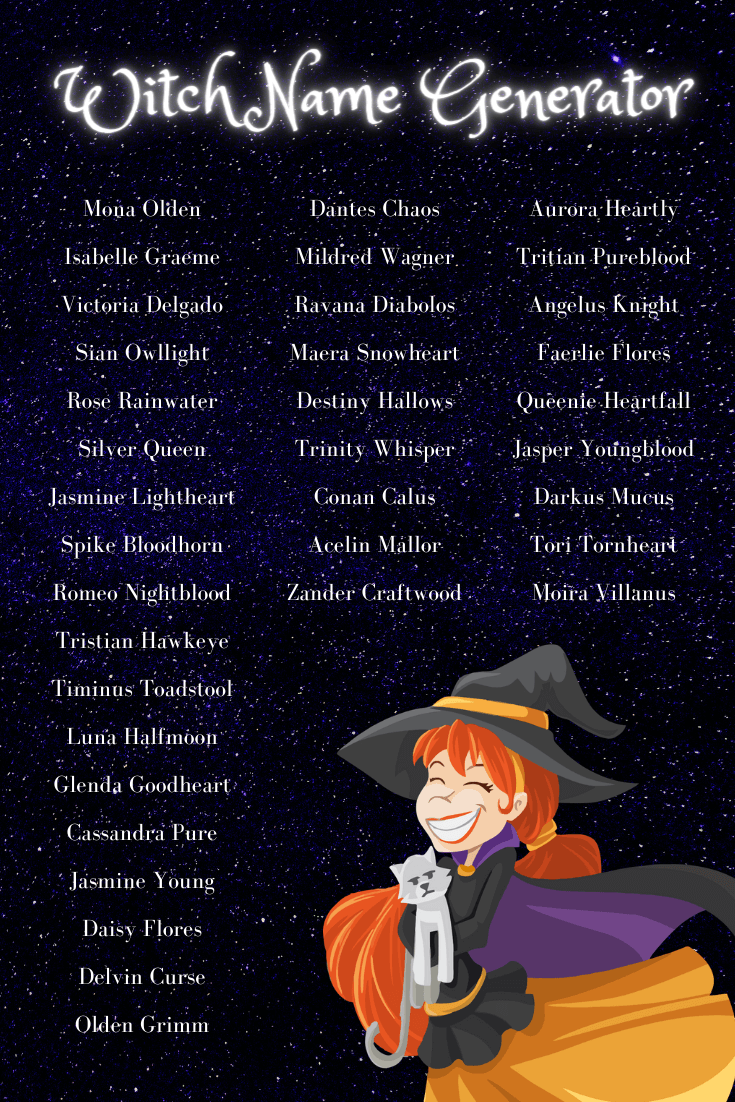Evil Female Names: Unveiling The Dark Side Of Femininity
In literature, film, and folklore, evil female names evoke images of cunning, manipulation, and malevolence. These names often belong to characters that embody traits we associate with villainy, making them captivating and memorable. Understanding the cultural implications and historical contexts behind these names can provide insight into societal views on femininity and power.
Throughout history, names have carried significant weight, influencing perceptions and even shaping destinies. In various cultures, certain names have become synonymous with evil or treachery, often due to their association with notorious female figures. This article explores a comprehensive list of evil female names, delving into their origins, meanings, and the infamous characters who bear them.
By the end of this article, readers will not only have a deeper understanding of these names but also appreciate the complex interplay between gender and villainy. Whether you’re crafting a story, naming a character, or simply curious about the darker side of names, this guide will serve as a valuable resource.
Table of Contents
- Biography of Notorious Female Figures
- The Most Notorious Evil Female Names
- Cultural Impact of Evil Female Names
- Psychology Behind Evil Female Names
- Famous Icons with Evil Female Names
- Evil Female Names in Literature and Media
- Historical Figures with Evil Female Names
- Conclusion
Biography of Notorious Female Figures
To understand the essence of evil female names, it is essential to examine the lives of notorious women throughout history. These figures often faced societal challenges and were labeled as villains due to their actions or the circumstances surrounding them.
Notable Figures
| Name | Background | Infamy |
|---|---|---|
| Cleopatra | Queen of Egypt | Known for her political alliances and tragic love affairs. |
| Lady Macbeth | Shakespearean Character | Symbol of ambition and madness, driving her husband to murder. |
| Elizabeth Bathory | Countess of Hungary | Accused of torturing and killing young girls for beauty treatments. |
The Most Notorious Evil Female Names
Here is a list of some of the most notorious evil female names, along with their meanings and origins:
- Medusa: In Greek mythology, Medusa is a Gorgon with snakes for hair. Her gaze could turn people to stone.
- Lilith: Often depicted as a demon in Jewish folklore, Lilith represents female independence and rebellion.
- Delilah: Known for betraying Samson in the Bible, Delilah's name has become synonymous with treachery.
- Bellatrix: Meaning "female warrior," Bellatrix is also a character in the Harry Potter series representing dark magic.
- Circe: A sorceress in Greek mythology known for transforming men into animals.
- Ravenna: The evil queen in "Snow White and the Huntsman," representing vanity and jealousy.
Cultural Impact of Evil Female Names
The cultural impact of evil female names extends beyond their characters. They shape narratives and influence how society views women in power. Historically, women with ambition or those who defied societal norms were often labeled as "evil" or "witches."
Changing Perceptions
In modern times, many of these names have been reinterpreted, presenting a more nuanced view of female power. Figures once considered villains are now seen as complex characters, highlighting the importance of context in understanding their actions.
Psychology Behind Evil Female Names
The psychology of evil female names touches on themes of fear, power, and femininity. Names associated with villainy can invoke a sense of dread or fascination in people, revealing underlying societal fears about powerful women.
Gender and Villainy
Studies indicate that women in positions of power are often scrutinized more harshly than their male counterparts. The negative connotations of evil female names reflect this bias, perpetuating stereotypes about women who assert themselves.
Famous Icons with Evil Female Names
Throughout pop culture, several icons with evil female names have emerged, capturing the imagination of audiences. Characters like Maleficent and Cruella de Vil showcase the allure of villainy, often leading to a complex relationship between the audience and the character.
Impact on Pop Culture
These characters have spawned numerous adaptations, merchandise, and fan theories, illustrating the lasting impact of evil female names on popular culture.
Evil Female Names in Literature and Media
Literature and media are rife with evil female names that have become iconic. From classic tales to modern novels, these names often serve as symbols of the darker aspects of human nature.
Examples in Literature
- Lady Macbeth from Shakespeare's "Macbeth"
- Hela from Marvel Comics
- Queen Jadis from "The Chronicles of Narnia"
Historical Figures with Evil Female Names
In addition to fictional characters, history is filled with women whose names have become synonymous with evil. Figures like Marie Antoinette and Jezebel have been vilified in their narratives, often overshadowing their accomplishments.
Historical Context
Understanding the context in which these women lived is crucial. Their actions, often viewed through a lens of morality, reflect societal values and fears about female power.
Conclusion
In conclusion, evil female names carry a wealth of cultural significance and historical context. They reveal much about society's perceptions of women and power, illustrating the complexities of femininity and villainy. Whether for storytelling or personal interest, exploring these names opens a dialogue about gender and morality.
We encourage readers to share their thoughts on evil female names and their meanings. What names resonate with you? Leave a comment below, and don't forget to check out our other articles for more intriguing insights!
Final Thoughts
Thank you for taking the time to explore the world of evil female names with us. We hope this article has provided valuable insights and sparked your curiosity about the darker side of femininity. Remember to return for more engaging content!
Article Recommendations
- Barron Trump Height Disease
- Pinay Scandal News 2024 Philippines
- Marietemara
- Scheels Black Friday Ad
- Ken Paxton Eye Injury
- Sophie Rain Video Free
- Pete Hegseth New Wife
- Maryeangelis Qvc Bio Wiki Age Family Husband
- Rickeymiley Wife
- Alex Lagina And Miriam Amirault Wedding


